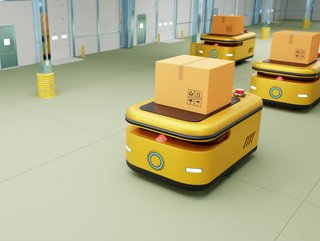AI & Robotics: Navigating an Evolving Workplace in 2024

Whilst robots have been around for some time, the robotics industry has recently entered into the business spotlight.
In line with the current digital revolution, enterprises are looking for new ways to innovate with digital technologies, from improving workplace productivity to improving operational efficiencies. Consequently, AI and automation has emerged as a ground-breaking solution.
Last year (2023) was all about exploring these technologies. From Agility Robotics implementing its Digit robot into Amazon warehouses, to newer companies like 1X achieving global funding support, combined with generative AI (Gen AI) driving advances in Robotic Process Automation (RPA), the robotics landscape is starting to look more animated as we progress further into 2024.
Navigating changing global demands
Humanoid robots in particular have been posed as a valuable resource within key industries like manufacturing, as they can complete tasks that are either unsafe or inefficient for human employees to complete. From handling heavy loads or toxic substances, to managing repetitive tasks, robots can help companies prevent accidents and save time and money.
Recent advances in deep learning algorithms have also allowed robots to perform more complex tasks. These range from pattern recognition to more decision-making capabilities, in addition to interacting more with its surroundings.
In line with the fast-paced development of Gen AI technologies, this year sees robotic exploration turned into action. Increasing numbers of industry leaders now predict that the industry is set to hugely accelerate.
“Enterprise leaders certainly recognise AI’s potential value, with more than 80% of businesses set to use Gen AI by 2026,” Ed Challis, Head of AI Strategy at UiPath, tells us. “However, the ability to deploy the technology responsibly is still largely immature, with concerns from executives around risk and governance.
“2024 will be the year that this perception changes and organisations see AI progress from aspiration to implementation.”
Robots could hold the key to enhanced business transformations moving forward. They hold great potential to improve operations, given their accuracy and attention to detail, the ability to complete repetitive and often strenuous tasks and no need for downtime.
Amazon is a clear example of a company that has seamlessly integrated robots into its operations. At the end of 2023, the company had deployed more than 750,000 robots to test human-like robot solutions at its robotics research and development site. This involved getting the robots to perform repetitive tasks and work collaboratively with employees.
“It has been interesting and perhaps surprising to see AI changing the lives of office workers before it touches working practices in most factories,” Anders Billesø Beck, Vice President of Strategy and Innovation at Universal Robots, tells us.
“We have many partners developing applications using AI to allow our robots to perform more complex and diverse functions. For example, AI allows robots to have human-like perception, handle variation, move parts precisely, adapt to changing environments, and learn from their own experience.
“With time, these capabilities will lead to unprecedented flexibility, quality and reliability in manufacturing.”
Workplace anxieties: Human replacements versus workplace assistants
However, as with any AI in the midst of a digital transformation boom, there are inevitable anxieties that must be addressed.
Whilst AI can be seamlessly integrated into the workplace, its increased sophistication has sparked fears that it will assist business development to the detriment of human employees - making jobs obsolete or even replacing humans altogether.
Plenty of technology companies have already undergone significant layoffs over the past year, including the likes of Google, Amazon, Twitch and Discord. 2023 saw the highest yearly total of tech job cuts since the Great Recession, with companies cutting more than 720,000 jobs from their budgets.
Given that robots can increase workplace productivity and reduce costs for businesses, the importance of widespread AI ethics and regulation has never been more paramount.
Ed Challis says: ““Effective AI governance is critical for driving strong AI results. If implemented correctly, it can go further than positively affecting productivity and efficiency – it can also enhance an organisation’s risk and governance posture.
“The next year will also be one where companies recognise the critical importance of putting people at the centre of their AI strategy.”
Speaking on how humans and robots can work in tandem, he adds: “A key part of realising AI’s value is creating the processes for employees to review the output of machines. As a result, we’ll see greater adoption of human-in-the-loop validation and control measures on AI systems. This will further enable enterprises to take big strides in AI deployment to automate and optimise their processes, while ensuring that they make their staff an important part of the journey.”
Despite global AI concerns, when it comes to robotics, many industry professionals see automation as no longer a narrative of ‘workers versus robots’. It is generally understood that, with increased developments in the automation sector, human-robot collaboration (HRC) will be achieved successfully.
In fact, a study conducted by Protolabs, ‘The Balancing Act: Unlocking Innovation in Manufacturing' found that advances in AI and automation are changing the landscape of the manufacturing industry in particular. The findings revealed that automation is improving the efficiency, safety and accuracy of production while minimising the risk of human error.
Bjoern Klass, Vice President and Managing Director of Protolabs Europe, spoke to AI Magazine about the study. He says: “The increasing use of robots that work collaboratively with humans (cobots) will enable innovation, boost productivity and improve workplace safety and mental health in the workplace.
“56% of the adopters say the technology will contribute towards a safer working environment and 54% think their deployment will augment their employees’ mental health.
Protolabs’ research also counters concerns that cobots will replace human workers, with 53% of respondents saying that they expect their implementation to drive an increase in the human workforce and 55% saying it will increase the need for staff training and upskilling.
2024 and beyond: Businesses must be prepared
The general consensus is that robots will work with, rather than against, humans. However, the need for robust training and upskilling programmes for human employees is still a must for businesses.
As robots become increasingly more developed, businesses must have a clear AI strategy in place. Likewise, all employees must fully understand the strategies and corporate goals in place in order to work better alongside robots.
Bjoern Klass says: “Soft robotics and new materials will have the biggest impact on how robotics manufacturing will develop in the year to come and beyond. The soft robotics, such as grippers that enable robots to perform more logistical tasks, market is expected to have a compound annual growth rate of 35.1% between 2022 and 2027, with biomedicine, food and agriculture set to benefit.”
Klass also suggests that leaders can prepare by implementing upskilling and reskilling initiatives, analysing skills gaps, aligning strengths with future needs, and using various learning methods. External options like hiring, outsourcing, and partnerships are considered, along with practices like automation, employee transfers, and work redesign.
By having a clear understanding of how the robotics sector works, in addition to current and future industry trends, businesses can succeed.
******
Make sure you check out the latest edition of AI Magazine and also sign up to our global conference series - Tech & AI LIVE 2024
******
AI Magazine is a BizClik brand






